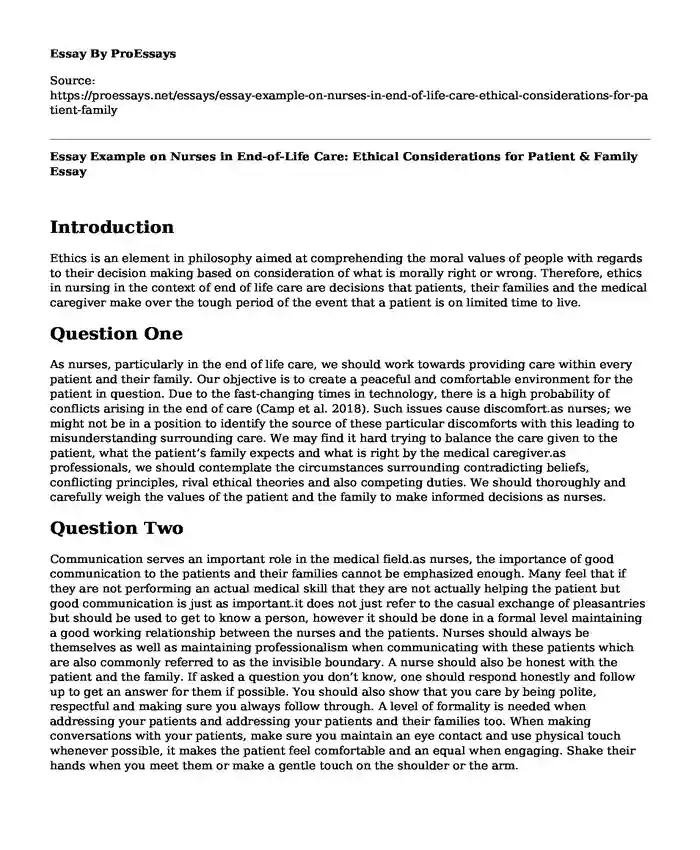Introduction
Ethics is an element in philosophy aimed at comprehending the moral values of people with regards to their decision making based on consideration of what is morally right or wrong. Therefore, ethics in nursing in the context of end of life care are decisions that patients, their families and the medical caregiver make over the tough period of the event that a patient is on limited time to live.
Question One
As nurses, particularly in the end of life care, we should work towards providing care within every patient and their family. Our objective is to create a peaceful and comfortable environment for the patient in question. Due to the fast-changing times in technology, there is a high probability of conflicts arising in the end of care (Camp et al. 2018). Such issues cause discomfort.as nurses; we might not be in a position to identify the source of these particular discomforts with this leading to misunderstanding surrounding care. We may find it hard trying to balance the care given to the patient, what the patient’s family expects and what is right by the medical caregiver.as professionals, we should contemplate the circumstances surrounding contradicting beliefs, conflicting principles, rival ethical theories and also competing duties. We should thoroughly and carefully weigh the values of the patient and the family to make informed decisions as nurses.
Question Two
Communication serves an important role in the medical field.as nurses, the importance of good communication to the patients and their families cannot be emphasized enough. Many feel that if they are not performing an actual medical skill that they are not actually helping the patient but good communication is just as important.it does not just refer to the casual exchange of pleasantries but should be used to get to know a person, however it should be done in a formal level maintaining a good working relationship between the nurses and the patients. Nurses should always be themselves as well as maintaining professionalism when communicating with these patients which are also commonly referred to as the invisible boundary. A nurse should also be honest with the patient and the family. If asked a question you don’t know, one should respond honestly and follow up to get an answer for them if possible. You should also show that you care by being polite, respectful and making sure you always follow through. A level of formality is needed when addressing your patients and addressing your patients and their families too. When making conversations with your patients, make sure you maintain an eye contact and use physical touch whenever possible, it makes the patient feel comfortable and an equal when engaging. Shake their hands when you meet them or make a gentle touch on the shoulder or the arm.
Question Three
Working in end of life simulation comes with tons of experiences such as learning to adjust to every unique patients needs differently, learning to be always mindful when making decisions or helping the patient in making them through giving honest assessments and information to them, evaluating your options to be flexible to the patient and family’s needs among others.as you continue to work in this department, you understand that death is a compulsory stage In life and is inevitable. The perceptions that it is supposed to be sad and sorrowful can be slowly adjusted by the care givers through the correct administration of the end of life simulation by nurses (Camp et al. 2018). Death is simply a passage and everyone deserves the comfort and a peaceful transition into the afterlife.in my line of work, it is my duty to make sure I do my best to attend to my patients and their families adequately and compassionately while at that tough stage.
References
Camp, M. E., Jeon-Slaughter, H., Johnson, A. E., & Sadler, J. Z. (2018). Medical student reflections on geriatrics: Moral distress, empathy, ethics and end of life. Gerontology & geriatrics education, 39(2), 235-248.
Cite this page
Essay Example on Nurses in End-of-Life Care: Ethical Considerations for Patient & Family. (2023, Sep 10). Retrieved from https://proessays.net/essays/essay-example-on-nurses-in-end-of-life-care-ethical-considerations-for-patient-family
If you are the original author of this essay and no longer wish to have it published on the ProEssays website, please click below to request its removal:
- Some Questions on Deaf and Hard Hearing People
- Interdisciplinary Collaboration to Select a Clinical Measure
- Effects Of Temperature And Culture On Medium
- Biopsychosocial Intervention Paper Example
- How Telehealth can be Incorporated into the Surveillance System - Research Paper
- Essay Example on Plant-Based Diets: A Growing Trend for Better Health and Wellbeing
- Essay Example on Optimizing Shift Exchange for Nurses: SIPOC Method







